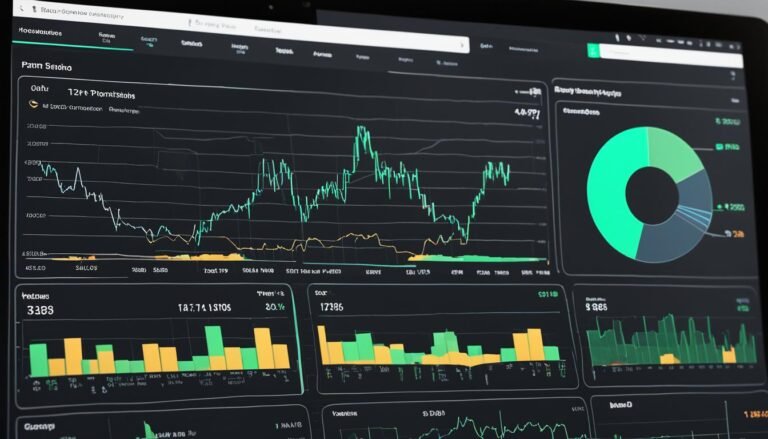Career Paths in Quant Finance
Curious about the intricate world of Quantitative Finance and the diverse career paths it offers?
From delving into complex financial models as a Quantitative Analyst to maneuvering market uncertainties as a Risk Manager, the opportunities in this field are vast and dynamic.
But have you ever wondered which path might suit your skills and aspirations best?
Let's explore the nuances of each role and discover the exciting possibilities that await in the domain of Quant Finance.
Key Takeaways
- Quantitative finance offers diverse roles like Quantitative Analyst, Risk Manager, Portfolio Manager, and Financial Engineer.
- Risk management strategies include stress testing, VaR calculations, and backtesting models for effective risk mitigation.
- Investment decision-making involves statistical modeling, machine learning, and behavioral finance insights for informed choices.
- Proficiency in Python, R, C++, and SQL, along with collaboration and communication skills, are crucial for Quantitative Developers.
Quantitative Analyst
Curious about the intricacies of financial modeling and data analysis? Become a Quantitative Analyst in the field of Quant Finance. As a Quantitative Analyst, your primary focus will be on utilizing quantitative modeling techniques to extract valuable insights from financial data. Your role is essential in helping financial institutions make informed decisions, manage risks, and develop trading strategies.
In this position, you'll be responsible for collecting, cleaning, and analyzing large datasets to identify patterns and trends. Your expertise in statistical analysis and programming languages like Python, R, or MATLAB will be important for building complex models that assess market risks and predict future market movements. By leveraging your skills in quantitative modeling and data analysis, you'll provide actionable recommendations to traders, portfolio managers, and other stakeholders.
Additionally, as a Quantitative Analyst, you'll play an important role in developing and implementing algorithms for automated trading systems, optimizing trading execution, and monitoring trading performance. Your ability to interpret complex data sets and communicate your findings effectively will be key in driving strategic decision-making within your organization.
Risk Manager
To further deepen your involvement in risk assessment and mitigation within the domain of Quant Finance, the role of a Risk Manager emerges as a pivotal position requiring meticulous scrutiny and foresight. As a Risk Manager, you will be responsible for overseeing the risk management process, ensuring compliance with regulatory standards, and implementing effective risk modeling techniques. One of your key tasks will involve conducting stress testing and scenario analysis to assess the resilience of financial portfolios under various market conditions. By utilizing sophisticated quantitative tools and methodologies, you will identify potential risks, develop risk mitigation strategies, and communicate findings to stakeholders. The table below provides a snapshot of the core responsibilities involved in the role of a Risk Manager:
| Responsibilities | Description | Skills Required |
|---|---|---|
| Risk Assessment | Analyze and evaluate potential risks | Analytical Thinking |
| Regulatory Compliance | Ensure adherence to industry regulations | Knowledge of Laws |
| Scenario Analysis | Conduct stress testing scenarios | Quantitative Skills |
Portfolio Manager
As a Portfolio Manager, you'll need to implement effective risk management strategies to optimize investment decisions.
By analyzing market trends and evaluating various assets, you can make informed choices to maximize portfolio performance.
Understanding how to balance risk and return is essential for achieving long-term investment success in quantitative finance.
Risk Management Strategies
Implementing effective risk management strategies is essential for portfolio managers to navigate volatile financial markets successfully. To achieve this, portfolio managers utilize stress testing methods and scenario analysis to evaluate how portfolios might perform under adverse conditions. Additionally, they rely on Value at Risk (VaR) calculations to quantify potential losses within a specific timeframe at a given confidence level.
VaR is often complemented with rigorous backtesting techniques to guarantee the model's accuracy and reliability. By integrating these risk management tools into their decision-making processes, portfolio managers can proactively identify and mitigate potential risks, ultimately safeguarding the portfolio's performance and ensuring long-term success in the face of market uncertainties.
Investment Decision-Making Techniques
Effective investment decision-making techniques are essential for portfolio managers to optimize returns and manage risks in dynamic financial markets. Utilizing statistical modeling and machine learning can help in analyzing vast amounts of data to identify trends and patterns for informed investment decisions.
Additionally, incorporating insights from behavioral finance and understanding market psychology is critical for steering through market fluctuations and investor sentiment. By combining quantitative analysis with qualitative factors, portfolio managers can make well-informed decisions that align with their investment objectives and risk tolerance.
Implementing a robust investment strategy that integrates both quantitative and qualitative techniques can enhance portfolio performance and mitigate potential risks in an ever-changing financial landscape.
Financial Engineer
With a focus on quantitative analysis and financial modeling, a Financial Engineer plays an essential role in developing innovative strategies for investment firms and financial institutions. Financial engineers utilize advanced mathematical and computational tools to create models for pricing and hedging various financial instruments, particularly derivatives. Their expertise in financial modeling allows them to assess the risks associated with complex financial products and develop strategies to mitigate these risks.
One of the primary responsibilities of a Financial Engineer is to work on derivatives pricing. This involves developing sophisticated models that accurately value derivatives such as options, futures, and swaps. By understanding the intricacies of these instruments and the underlying market factors, financial engineers can provide valuable insights into pricing and risk management strategies.
Financial engineers also play a critical role in product development and innovation within the financial industry. By leveraging their quantitative skills and knowledge of financial markets, they can create new financial products that meet the evolving needs of investors and institutions. Overall, a career as a Financial Engineer offers a dynamic and challenging environment where analytical thinking and strategic decision-making are key to success.
Algorithmic Trader
As an Algorithmic Trader, you'll need to master various trading strategies and constantly adapt to changing market conditions.
Utilizing cutting-edge technology and tools is essential for executing trades swiftly and efficiently.
Understanding the intricacies of algorithmic trading will be vital for success in this fast-paced and competitive field.
Trading Strategies Used
When operating as an Algorithmic Trader in quant finance, one important aspect to focus on is the selection and implementation of trading strategies. Here are some key strategies to contemplate:
- Statistical Arbitrage: Utilize statistical models to identify pricing inefficiencies in the market and profit from mispricings.
- High Frequency Trading: Implement algorithms that capitalize on executing a large number of orders at rapid speeds to take advantage of small price discrepancies.
- Pairs Trading: Simultaneously buy and sell two correlated assets to profit from the relative price movements between them.
- Mean Reversion: Identify assets that have deviated from their historical average prices and bet on them returning to the mean.
These strategies require a deep understanding of market dynamics and the ability to react swiftly to changing conditions.
Technology and Tools
In exploring the domain of Technology and Tools for an Algorithmic Trader in quant finance, a critical aspect to contemplate is the selection and utilization of advanced software and platforms tailored for high-frequency trading strategies. Data analysis plays an essential role in identifying patterns and trends within financial markets, aiding algorithmic traders in making informed decisions.
Utilizing machine learning algorithms enables traders to develop predictive models that adapt to changing market conditions, enhancing trading strategies' effectiveness. Implementing efficient data processing techniques is vital for algorithmic traders to handle vast amounts of information swiftly and accurately.
Quantitative Developer
Quantitative developers play an important role in implementing complex financial models and algorithms within the domain of quantitative finance. As a quantitative developer, your expertise in quantitative coding and software development is essential for success in this role.
Here are key aspects to keep in mind:
- Quantitative Coding: Your proficiency in languages such as Python, R, C++, and SQL is crucial for developing and implementing quantitative models effectively.
- Software Development: Understanding software engineering principles and practices is vital for creating robust and scalable financial applications.
- Model Integration: You'll be responsible for integrating quantitative models into trading systems, risk management tools, and other financial software.
- Collaboration: Working closely with quantitative analysts and traders, you'll translate mathematical models into functional software solutions, requiring strong communication and teamwork skills.
Conclusion
As you consider the various career paths in quant finance, remember that each role offers unique opportunities for growth and impact.
Whether you're drawn to quantitative analysis, risk management, portfolio management, financial engineering, algorithmic trading, or quantitative development, your skills and expertise will play a pivotal role in shaping the future of financial markets.
Embrace the challenges and uncertainties that come with this dynamic field, and trust in your ability to navigate the complexities of the industry with confidence and precision.







